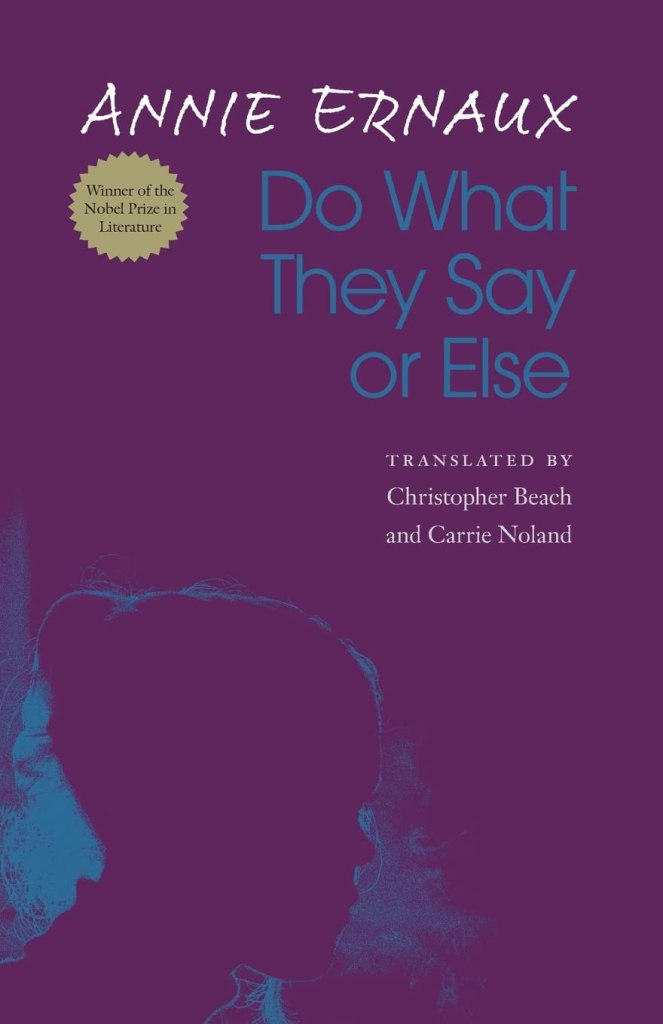Do What They Say or Else was Annie Ernaux’s second novel (after Cleaned Out), originally published in 1977 and only now translated into English by Christopher Beach and Carrie Noland. It tells the story a fifteen-year-old girl, Anne, set largely in the summer between collège (middle school) and lycee (high school). Like Ernaux herself, Anne is the child of working-class parents who are proud of her educational success but often demonstrate this by nagging her to do better:
“My parents don’t have their high school diplomas, and yet they’re a thousand times more annoying about it than Céline’s parents who are engineers or something.”
In the novel we see her drift away from her parents, her mother in particular. At one point she remembers when her mother worked in a textile factory and would spend Sunday afternoons sleeping. As a child she would lie down beside her, “like two dogs packed into the same crate.” Now even the memory repulses her as she enters adolescence:
“…it doesn’t matter how much my parents talk about how they want the future to be: they’ll always represent my childhood and the past.”
Much of her rejection of her identity as a child is centred around her developing sexuality, and we see many echoes of her later work, A Girl’s Story. “What would I rather have, good grades or a good body?” Anne asks herself, “It would be too much to ask for both.” Her opportunities to meet boys are limited as her mother is watchful and Anne rarely leaves the house. Most of her friends are on holiday, but one day she meets an older girl she knows from school, Gabrielle, and they arrange to go to the fair together after being invited by some boys on scooters, neighbours of Gabrielle:
“…the boys had come, a sign a kind of complicity was growing between us. There wasn’t much else between us, and if you don’t count boys and sexual things we weren’t really friends.”
It is through Gabrielle that Anne meets some older boys who are working at a summer camp for young children. When Gabrielle tells her that she has met a boy there, Anne is desperate to hear about it:
“She made me drool with anticipation, since it was, you might say, my own future that she was going to be telling me about.”
Ernaux’s great skill in articulating Anne’s thoughts, a skill that she will later use in her more autobiographical work, is already evident, from the insightful to the fleeting (“I would have liked to be even uglier than she was so she wouldn’t suspect anything”). It is this, along with her acerbic observations of her own family, that allow the novel to rise above its rather traditional trajectory of lost innocence – though it is perhaps also marked as different by Anne’s less than innocent approach to losing her innocence:
“Alberte said that her mother said that women never like it, and on the swing set I swore that I would like it even if that wasn’t normal.”
She begins to meet one of the camp counsellors, Mathieu, and her intentions are as much physical as they are romantic. It is as if she hopes sex will change her in some way, though inevitably, when it finally happens, it is disappointing:
“When he had succeeded in doing it I felt a brutal emptiness. I had always wondered what it would feel like inside. It felt like nothing.”
Anne becomes aware that she can be treated simply as a body – the word ‘brutal’ appears more than once – but she, too, thinks more about sex than she does about love. She also recognises the double standards at play:
“Curiosity is normal at my age: it would be strange if that wasn’t the case. Except that for girls, curiosity can lead to anything, and it’s frowned upon.”
Ernaux is of my parents’ generation, but her presentation of the confusions and passions of adolescence do not seem dated or irrelevant, despite the fact she is writer who foregrounds the social setting of her characters. It would be interesting to present this novel to a fifteen-year-old girl and ask her if she see anything of herself in Anne. Such is Ernaux’s honesty and accuracy, I strongly suspect she would.
